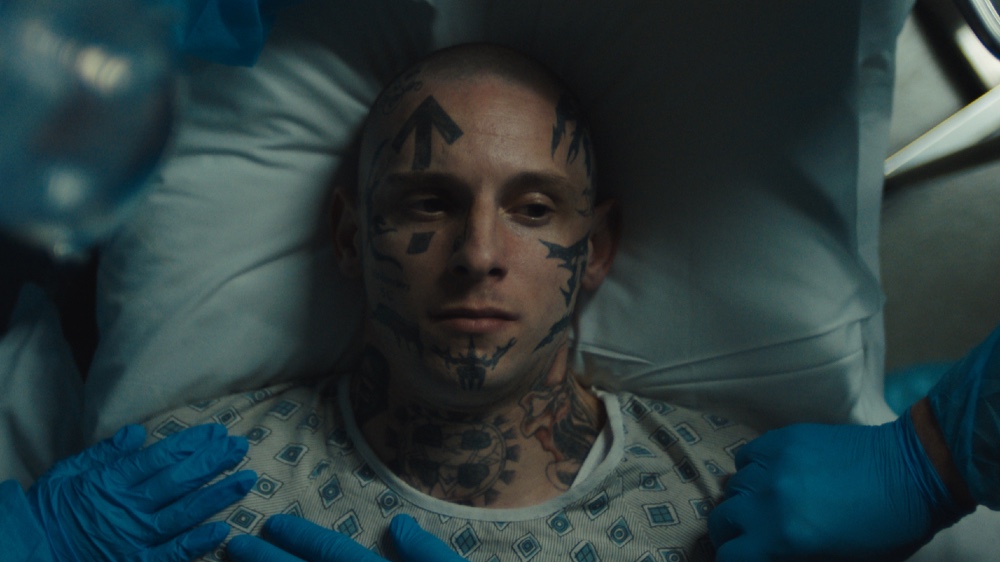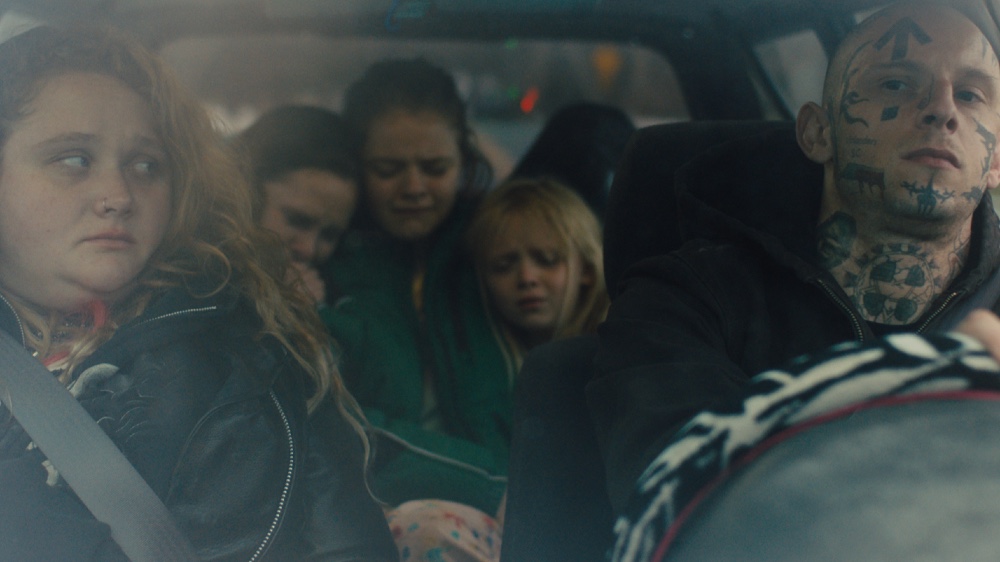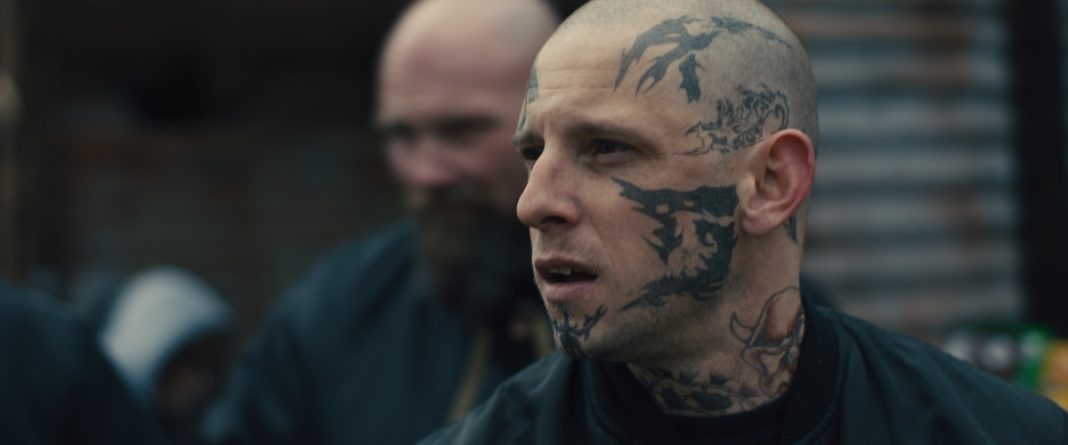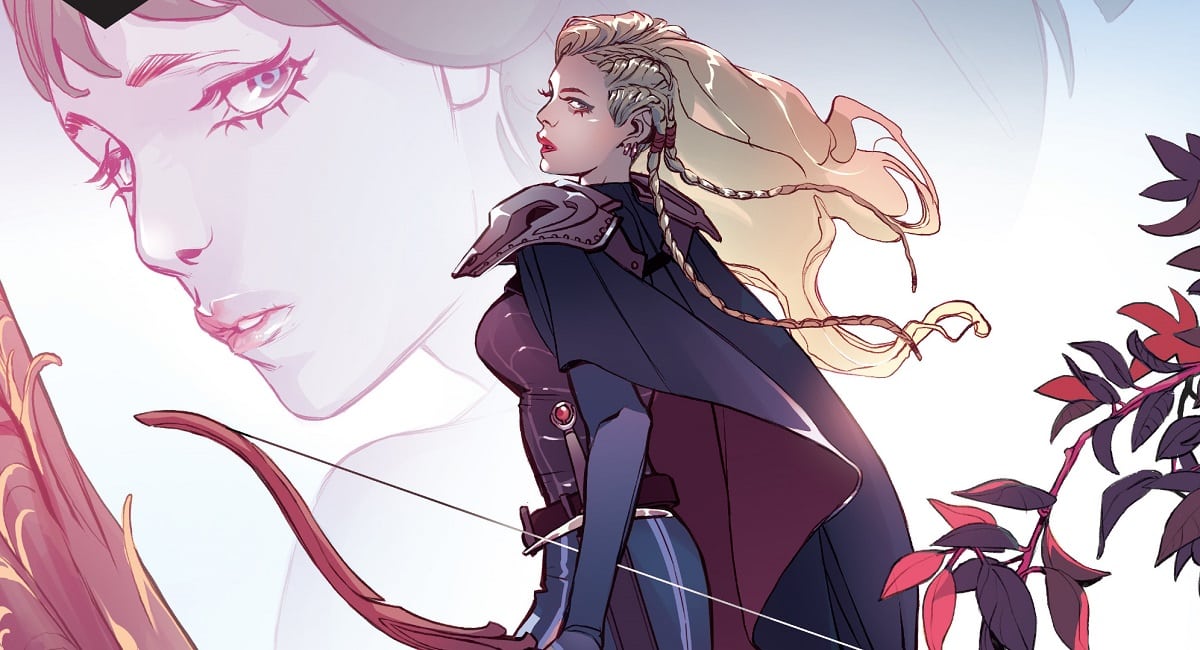This is another interview for a movie that’s a little different from the normal stuff you read about at The Beat, but that’s because Guy Nattiv’s Skin is also not the easiest movie to understand why it’s worth seeing.
The feature from the Oscar-winning director of the short film of the same name — the two films only share a title and a few themes – stars Jamie Bell (Fantastic Four, Rocketman) as Bryon “Babs” Widner, the heavily-tattooed member of a white supremacist group who starts to have a change of heart. That partially comes from meeting Danielle Macdonald’s Julie, the mother of three girls, but he’s also influenced by an FBI agent played by Mike Colter (Luke Cage), and Bryon has to figure out a way out of this lifestyle he’s chosen. Not helping matters is the pressure from the group leaders, played by Bill Camp and Vera Farmiga.
No, Skin, doesn’t have a lot to do with the normal genre films we try to cover here, but Bryon Widner is a real person and Nattiv has tried hard to capture all sides of his story, including his road to redemption which involves hours of surgery to remove the hateful Nazi tattoos on his entire body. If you regularly read autobiographical comics, you might be able to find a throughline with what Nattiv does in Skin, but more importantly, it’s another great performance from Bell, who was also great as Bernie Taupin in the Elton John Rocketmanearlier this year.
The Beat got on the phone with Bell earlier this week for the following interview:
THE BEAT: This movie really shook me up when I first saw it at the Tribeca Film Festival, and then I saw Rocketman a few weeks later, and I didn’t even recognized you as Bernie Taupin until about an hour or more into the movie. Just putting a wig on you after seeing you as a tattooed skinhead was enough to throw me off.
Jamie Bell: They could not be more dissimilar, I think, those characters.
THE BEAT: That must be one of the joys of being an actor, to be able to play such different characters. I assume this came to you as normal where you got a script and went after it. Guy has mentioned that you were scared to play Bryon? Can you talk about that? What were your impressions when you first read the script?
Bell: I met with Oren Moverman, our producer, actually for another project that he was considering directing. I’m not sure how really that project was at the time, so when I sat down with him, we kind of just shot the shit more than anything, got to know one another and had a couple drinks over Christmas and talked about family and that kind of thing. Very shortly in the New Year, after that conversation, this script arrived that Oren was producing, and he reached out to me personally and said, “Guy’s a very good friend of mine. He’s got a very distinct style of filmmaking, and he’s telling quite an intense story. Having sat down with you, I think you are the right guy to do this.” When I read the script I was like, “What on earth did he take away from our meeting that he thought I would be able to do something like this?” I read it, and I really was quite shocked by how graphic it was, the brutality in it, the levels of violence, things like that.
I met with Guy and was incredibly hesitant for many different reasons. As the project was coming together a lot of things were changing in the political landscape. I questioned a lot about the morality about doing something like this. I questioned of telling the story from this perspective, necessarily. Then also if I was going to do something like this, am I even capable of pulling it off? Are people really going to buy Billy Elliot as a neo-Nazi?

Then I saw the opportunity to hide inside of it and be somebody else and be somebody different. It felt if we framed it together. If we framed it in a way, if we didn’t make the film as an overall redemptive story, if we framed it more as an urgent wake-up call, maybe I could find some commentary in it that was useful for people. That hopefully it could hopefully affect some kind of change, or at least ask some questions and further a conversation.
THE BEAT: That’s interesting, because I felt it WAS a redemption tale and that’s kind of what I liked about it. When I spoke to Guy, he denied that it was that. I’m not sure what’s wrong with allowing people like Bryon to have redemption.
Bell: I think it’s also challenging people in how far are you willing to extend that sense of compassion? How far are you willing to extend that sense of forgiveness? I think each person will be different overall. The one thing that is the morality play at the end is that the bigotry and the hatred and the racism is learned behavior. No one is born that way, and I think the final scene of the film is bringing that into firm question and into a lot of clarity, because he’s seeing his son for the first time. Does it stop at this moment? Does he even cross that threshold, does she even let him in the door? Is his ideology going to stop here instead of bringing that into a new generation? I was appreciative that that was the framework of the story and that it was offering the character the opportunity to be different, but we didn’t necessarily get to see it.
THE BEAT: This was at Toronto last year, so you must have filmed it a year and a half ago. When you received the script, was that even before the current President in the States and all the Brexit stuff? Was that before that was happening?
Bell: I got the script and then it didn’t get made until the following January or February, so I think the Presidential race, him and Hilary were going at each other, and then we made the film very shortly after he was inaugurated. Maybe he already was in office already, because the first time I spoke to Bryon was the day of Charlottesville – the first time I ever talked to Bryon Widner was the same day all that horrible stuff happened down there. I think all of that intensely hot political stuff that was happening in the country was always tipping me off center, because I don’t think I want to be associated with this, certainly because it’s being so emboldened and it’s been brought out of the darkness and they’re doing it in broad daylight now. It’s a much different time. These pockets of the sub-culture had been empowered to some degree. I would constantly text Guy and go, “I don’t know, man. I don’t know. We’re playing in a very dangerous sandbox, it feels like.” Because Guy has a very specific perspective. He’s Israeli, his family were persecuted by the Nazis in the second World War. For him, telling this story and telling it from this perspective, I’ve always found intensely interesting. Why would he, of all people, want to tell it from this perspective? Why does he have so much compassion for this character? His passion for it was really something that kind of kept me on track and kept me going, because I thought that if he has an interesting eye in this world maybe that he can see something I can’t, so I appreciated that.
THE BEAT: I wanted to ask you about meeting with Bryon. What was your first meeting with him and what kind of questions did you have for him? I understand that he’s a very smart guy who went through the experience himself, so what did you want to ask him?
Bell: A lot. I wanted to know his take on the script. I wanted to know a lot about his life before he was involved. I wanted to know a lot about his family life, you know a lot of the stuff that we don’t really get to see in the movie, because the movie starts when he’s already in it. So I wanted to know what his life was like before then, his relationship with his father specifically. His family life is mostly terrible, as you can imagine, but also, I was very honest with him and said, “I don’t necessarily see you as the hero of this film and I certainly don’t agree with the things that you’ve done, but if you’re honest with me, I’ll be honest with you. I want to make a clear as a fully-dimensional a portrait of you as a person at this time that I possibly can.” We spent a good week together, but it was daunting going up there. He’s in the FBI witness protection program, and he’s had links to this world, which is a scary world, so I did feel a little trepidatious even going up there, but yeah, as Guy says, very smart, incredibly articulate, a real family man. A lot of the time we had to stop recording and stop doing the interviews, and he had to go pick up his kids from school. He’s trying to live as normal a life as he can. Also this, is that if you didn’t know he had tattoos all over his face, you would just have no idea that they were ever there. The guy has been giving another lease on life. He’s been given this extraordinary gift, which I’m sure is a conflicting thing for him. I sure he looks in the mirror and feels the guilt of that and the remorse of his actions, and that’s something he has to reckon with for the rest of his life.

THE BEAT: Was this a hard character to get out of? I know that you kept the tattoos on around the clock to save time in make-up, so was it hard to get out of the character at the end of the day or even when you’re done making the movie?
Bell: I always like to think that being an actor, you always can check the role at the door. You take the costume off and you walk off the set and then it’s easy to kind of drop it. I did think that I was doing a good job of that. It wasn’t until about a week later once production was done, I was back home and my wife one day was like, “Can you just go take a walk or go run it off?” I think I was just carrying around this hostile energy. This angry, standoffish, hostile tight energy that I think when you’re in the mix of a small movie like this especially, there’s no real time to turn off doing many scenes a day. There’s no luxury of time. You’re just in the thick of it. I thought I was actually doing okay, but she disagreed. Just walking around with that attitude just can’t be good for you.
THE BEAT: I was looking over your filmography, and I realized that you never really shied away from dark movies or difficult characters. Dear Wendy, Chumscrubber, you did a movie with Lars von Trier. You really get into that. Hallam Foe, of course. What’s the appeal of doing these darker movies in between Billy Elliot and Rocketman?
Bell: I don’t know. I probably should stop doing them really. (laughs) I find that there’s a little bit of complexity in them. There’s complexity in lighter characters as well, but I think when I see movies, I genuinely like to be challenged. I like to be challenged if I like a person and most people aren’t black or white. I enjoy kind of playing in the grey area of characters. I don’t think a film should necessarily be wrapped up in a bow very neatly, because life doesn’t work out that way. Can people sympathize with a Nazi? Do I actually love a sado-masochist, like K in Nymphomaniac? A boy who is in love with a handgun. There are all very bizarre off-center weird characters that I’ve been lucky to have played. I guess I find interest in there. I think the challenge of it, too, is can you make people feel for these off-color people? Is that the trick? Is that one of the hardest tricks you can do.
THE BEAT: One of the brighter characters you played was Tintin, which is interesting, because it was animated, you can play him whenever and don’t have worry about being seven or eight years older than the last time. Have there been any conversations with Steven Spielberg or Peter Jackson about doing more? I felt it did very well overseas,s and he’s still a popular character. Do they still hope to make more movies as was the original plan?
Bell: We check in with them every year, just to see if this is going to happen because I have these other things going on, and they’re always like ‘Yes, it’s our every intention to make it, so…” Whenever they want to do it. Me and Andy [Serkis] and the chance to get to work with him again would be great. I love that property. I think it’s really fun, and I think Steven [Spielberg] did a great job with the first one, so I would always love to do more and explore it a little bit further.
Skin opens in select cities and On Demand on Friday, July 26. You can also read what Bell had to say about the failed 2015 Fantastic Four movie.







